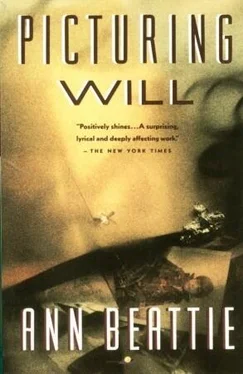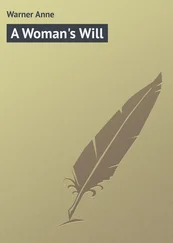“Guess who!” a flamingo said, stepping in front of her. She could smell alcohol on the flamingo’s breath. Like the private detective, she looked down and saw Duncan’s worn Adidas, though she could have told from the voice alone.
“Duncan,” she said, and he nodded without taking off his headpiece. A palm tree stood next to him: someone in a badly made outfit fashioned out of a sheet painted to look like wood. Big green-painted cardboard palm fronds protruded from the shoulders. The person wore a black eye mask, with a small painted moon curving over one of the eyes.
“Take our picture,” Duncan said, stepping in front of the camera. He put a pink wing around the palm tree. “Mel,” Duncan said, “I really enjoyed that Harry Mulisch book you let me borrow. I keep forgetting to bring it back.”
Jody inclined her head and looked into the camera. There they were: two happy, silly people who had no doubt given great thought as to how they would appear. They didn’t seem that different from the engaged couples who put on their best clothes and sat side by side to smile for posterity.
As Duncan and the palm tree walked away, a dog came up and sniffed Jody’s leg. A fireman tugged at the dog’s leash, smiling at Jody and Mel and saying that the dog was really a rabbit in disguise, but that he was a real fireman.
“I’m the woman in the Toulouse-Lautrec painting,” a blue-faced woman announced, butting her way in front of the camera.
Jody looked through the lens. The woman stood very still, chin resting on her shoulder.
“Got it,” Jody said, looking up. But she had not taken the picture. There was something about the woman she didn’t like — something deeper than the paint and the rakish hat. As the woman moved away Jody moved the tripod a little to the side, centering Mel in the picture. She did not take that picture either, because when she cared about someone, she didn’t like to waste time taking pictures that didn’t reveal him. Mel was sure that he was being photographed, though. He put the celery top back over his head and stood very formally, hands at his sides. Was it mock seriousness, or was he really so used to being accommodating? For a moment she felt vulnerable and sentimental, as if she wanted to rush into Mel’s arms.
That was the good thing about having a camera between you and the rest of the world: It afforded some protection, a way to stall for time. She walked forward and gave him only a quick hug. She could almost hear Mary Vickers’s voice: Playing with fire . She kissed Mel quickly on the lips. His lips were cool, as was his hand, which he put briefly on the back of her neck as they kissed.
She looked around for Mary Vickers, who had come as Cinderella, to say goodbye, but the room was very crowded.
It was possible that Mary Vickers had left early with Wagoner, who, as usual, had gotten drunk. Those thoughts flashed through her mind in the few seconds it took Mel to bend and zip her camera bag. Camera bag over his shoulder and tripod in her hand, the celery stalk and the American Bandstand cutie started out into the night.
As they left the church, Mary Vickers was about a mile ahead of them down the road. She had quarreled with Wagoner (if you could call it that — she insisted he turn over the car keys; he tossed them at her and walked off). She had sat in the cold car for a few minutes, expecting that he would come to his senses and reappear, but as she waited she got angrier and thought that he could find his own way home. One of his drinking buddies could escort him. One of those men whose faces got mottled by drink until they turned as rosy as the madras pants they wore.
Mary passed over a small bridge and looked at the moon glowing over a field. She drove by a trickle of a brook that passed under some willow trees. The spring before, during Will ’n’ Wag’s short-lived fascination with butterfly hunting, she and Jody and the boys had picnicked under those trees. Jody had described to her a photograph of Nabokov, running forward with a butterfly net — Jody could make other people’s photographs seem more real than what was actually in front of her as she spoke — and they had agreed that, at the boys’ early age, it was impossible to say what interests would keep up, what hobbies were worth investing money in. Mel had fashioned the butterfly nets from netting that held the padding around busts that had been shipped to the gallery in New York, and sturdy sticks he had collected on a walk. In spite of everyone’s complaints that there were no available men in New York, when you did find a New York man, he seemed too good to be true. It was her ex-lover she was thinking of.
Licking her chapped lips, she remembered his taste for alcohol that burned going down — drinks meant to get you wired, none of those diluted bourbon-and-waters that Wagoner sipped until bedtime. She tried to think that she had been attracted, yet again, to another alcoholic, but that was an oversimplification. She had been attracted to someone who was energetic and a little crazy, and who had ventured to involve her in his flirtation with danger.
A sepia shadow spread in front of the car. She found it difficult to believe that what she saw was real, that it wasn’t just some externalization of what had been going through her mind. It was as if Impossibility had materialized — taken real form — so that she could hit up against it. What had been going through her mind? The willow trees sprang up. She had bit her lip as the car slammed to a stop. There was the cold taste of blood in her mouth.
She had hit a deer. All in a second, her thoughts and her car collided with a deer that ran in front of the headlights. She touched her seat belt to make sure it was fastened. She looked out the front window. For a vertiginous second, the shadow rose and twisted before it crumpled, like something in a horror movie. She fiddled with the shoulder strap of the seat belt like a lady lightly fingering her corsage. Below her fingers, her heart was racing. She said — probably out loud—“My God. I hit a deer.”
There were no other cars. She kept searching the rearview mirror. She looked out the window on the passenger’s side and saw the moon again, but no cars coming in either direction. In a few seconds headlights flashed into the rearview, but by then it seemed she had been sitting there for an hour. She was too shaken to get out of the seat. Rather than having an urge to bolt, she felt glued in place: a heavy person, a ludicrous statue, a woman in a formal dress sitting behind the wheel of a car, a deer crumpled in front of her headlights.
Lights began to blink behind her. A man in a tuxedo who had been at the party was tapping on the window, asking if she was all right. His round-faced wife, who had dressed as Mao, was standing behind her husband, her hands clasped over her mouth. Eventually she lowered one hand and made a circular motion.
The window rolled down, but Mary Vickers didn’t remember having done it. New York, she thought suddenly, but what she was saying was “No. I’m fine.” She was fine, but she had hit a deer. Mao’s hand was now clasping her hand, which gripped the seat belt.
As more cars stopped, Mao helped her out of the car. A real estate agent dressed as Peter Pan ran past everyone and bent over the deer. “Stay back,” he shouted. “You don’t know what’s going to happen.” He said that he had a rifle. That he had a rifle, but he didn’t think he was going to have to use it. Suddenly Wagoner had come from nowhere and was looking at Mary, perplexed. Or maybe he was worried. Or angry, because people in front of the car were assessing the damage. One headlight shot off to the side, cockeyed. There was the moon, over to the right, and the beam of light to the left from the headlight.
Читать дальше












